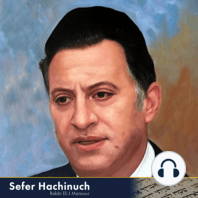20 min listen
Misva #81: To Not Tip the Judgment of an Evildoer
FromSefer Hachinuch
ratings:
Length:
20 minutes
Released:
Nov 25, 2021
Format:
Podcast episode
Description
The Torah commands in Parashat Mishpatim (Shemot 23:6), “Lo Tateh Mishpat Ebyonecha Be’ribo” – “Do not distort the judgment of an impoverished person in his trial.” The plain meaning of this verse is that judges may not rule in favor of a poor litigant who they feel is guilty, out of compassion for his plight. However, this command was already issued several verses earlier (“Ve’dal Lo Tehedar Be’ribo” – Shemot 23:3), and thus does not need to be repeated here. The Gemara therefore understood the word “Ebyon” (“impoverished person”) in this verse as a reference to somebody who is spiritually “impoverished,” meaning, a sinful person. The Torah here commands judges not to convict a sinful person unjustly, just because he is an evildoer. Every court case must be tried fairly and honestly, and the decision must be reached based on the objective facts, and not on external factors such as a litigant’s spiritual standing. The question arises as to why the Torah found it necessary to issue this command. Why would we have thought to allow judges to convict somebody based on the level of his religious observance? It seems obvious that just as it is clearly forbidden to steal from somebody who commits sins, it is likewise forbidden for judges to rule that he owes somebody money when he in fact does not. One explanation given by the commentators is that this command is needed to establish this prohibition in the exceptional case of a sinner from whom stealing is permissible. According to Halacha, a “Moser” – somebody who cooperates with hostile gentile governments by informing them where the Jews’ property is so it could be confiscated – forfeits all rights to his own property. Since he disregards his fellow Jews’ right to their money, he loses rights to his own money, and it may be seized. A judge might therefore find it legitimate to rule against a “Moser” when he is taken to court, even if in this particular case he is innocent, since in any event he has forfeited all rights to his property. The Torah commands that this is not allowed, and even if one of the litigants is a “Moser,” the judge is required to decide the case fairly and impartially, treating the “Moser” no differently than any other litigant. In truth, this question was already asked by Rabbi Shimon Bar Yohai, as cited by the Mechilta. Rabbi Shimon answered that a judge might feel that since this litigant transgresses certain commands, he must be suspected of dishonesty. If he is willing to violate some Torah laws, then perhaps he can be presumed to be willing to speak falsely, as well. The Torah therefore commands judges to treat sinners in the courtroom no differently than other litigants, because the fact that they transgress some commands does not necessarily mean that they cannot be trusted to speak the truth. The reason underlying this command, as the Sefer Ha’hinuch explains, is that equality must be strictly maintained in the courtroom. In order to ensure a fair and just judicial system, it is critical that judges try every case objectively, and not be predisposed in favor or against either litigant for any reason. A judge who rules against a litigant because he is a sinner, disregarding the actual facts of the case, is in violation of this command. He does not receive Malkut for this violation, however, because the violation is committed without performing an action, and because it can be reversed by paying the litigant the money he was unjustly forced to pay the plaintiff. Violations which do not entail an action (“Lav She’en Bo Ma’aseh”) and violations which can be reversed by repaying the money (“Lav Ha’nitan Le’tashlumin”), are not punishable by Malkut, and so for both these reasons, a judge who transgresses this command does not receive Malkut.
Released:
Nov 25, 2021
Format:
Podcast episode
Titles in the series (100)
Misva #14: Feeding the Korban Pesach to a “Toshab” or “Sachir”: Daily Sefer Hachinuch - Brought to you by itorah.com by Sefer Hachinuch
